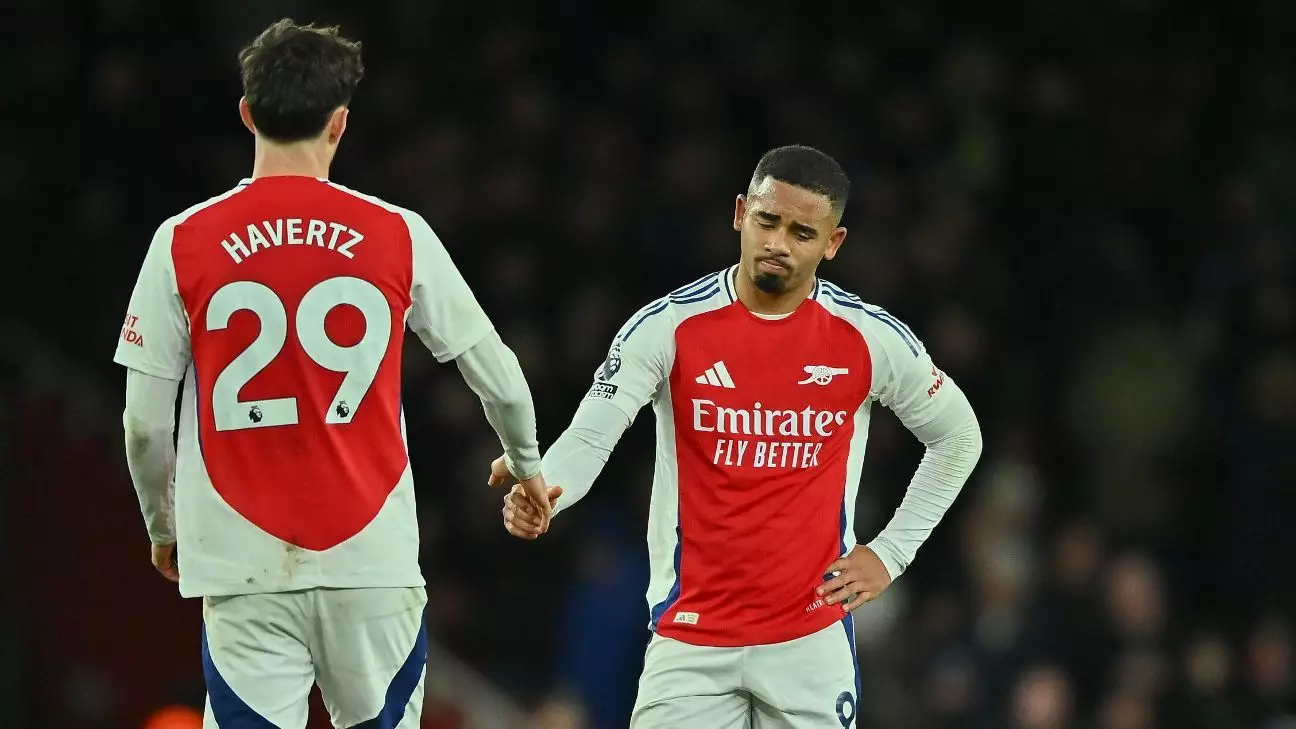In a competitive Premier League landscape, every match is crucial, yet Arsenal’s recent 0-0 draw against Everton raises serious questions about the team’s depth, strategy, and future in the transfer market. Despite the impressive talents of players like Martin Ødegaard and Bukayo Saka, the Gunners’ struggle to unlock a well-organized defense suggests that reliance on just a few key players may not suffice in their title ambitions.
Arsenal entered the season with loftier aspirations, driven by their impressive performances and the potential to reclaim a prominent place in English football. As Manchester City falters slightly, the spotlight turns even more brightly on the Gunners. However, the lack of offensive fluidity against Everton starkly contrasted with their earlier attacking exploits. The absence of goals from such a matchup must be dissected further, as it underscores a deficiency in creative options available to Mikel Arteta when needing a breakthrough.
While skillful players like Ødegaard and Saka have formed a dynamic attacking partnership, their efficacy can often appear diminished against teams that focus on defensive solidity. Arsenal’s struggles on Saturday illuminated the growing frustration among fans regarding the team’s inability to convert pressure into tangible results when faced with dogged opposition.
Critique of Arsenal’s lack of summer spending evaporated for a time as the team found success on the pitch, yet the echoes of that conversation are returning. With the January transfer window looming, the Gunners’ current stance of cautious spending is puzzling. The manager’s reluctance to invest heavily could serve as a hindrance when the squad needs fresh perspectives and alternative attacking threats.
Arteta’s preference for developing existing talent is commendable, but it raises the question: Is this philosophy insufficient to support a title challenge? Injuries and fatigue are inevitable in a grueling season, yet the team appears underprepared with their limited options off the bench. This could prove detrimental, especially as teams like Manchester City actively strategize to bolster their ranks amidst their recent struggles. Arsenal’s hesitation to take calculated risks in the market could cost them dearly.
Tactical decisions in matches also warrant scrutiny. Arteta’s choices to withdraw Ødegaard and Declan Rice—two players crucial to Arsenal’s attacking flow—reveals an inherent gamble that may have backfired. Transitioning a 17-year-old to replace a seasoned captain in such a tense match hints at a lack of strategic foresight. The impact of this decision manifested as Arsenal’s rhythm deteriorated and their cohesive attacking front fragmented.
Despite the frantic final stages of the game, when the pressure was on, misplaced passes and poor decision-making plagued Arsenal’s efforts to capitalize on their attacking chances. The failure to adapt as the match unfolded became evident, particularly as substitutions seemed more reactive than strategic. Arteta’s experiment with personnel led to disorganization rather than the rejuvenation that was sought.
One cannot discount the impressive record Arsenal set last season, scoring 91 goals, the highest in the club’s Premier League history. Yet, football is often a game of moments—moments of brilliance that can change the trajectory of a match. The Gunners’ inability to produce a spark when needed highlights the pressing need for astute attacks and creative midfield play. The paradox then lies in recognizing that while the squad is capable in many respects, it lacks the punch to deliver in tight situations, a quality that often differentiates champions from contenders.
Furthermore, the performance of substitutes like Kai Havertz and Leandro Trossard is cause for concern. With profiles suggesting they would add depth and quality, their failures to contribute meaningfully have bred disappointment. The potential impact of winter signings lies in their ability to blend into the system and provide results, but recent performances suggest that ineffective roles could define Arsenal’s season.
As Arsenal navigates the season ahead, the interplay between tactical efficiency and squad depth must be addressed. The disappointment against Everton should serve as a wake-up call, revealing vulnerabilities in both personnel and strategy. If the Gunners desire to sustain a genuine title bid, a balance must be struck between nurturing talent and actively pursuing strategic acquisitions in the transfer market. Excellence cannot solely be built on capability and potential; rather, the injection of experience and creativity is essential to escape the mundanity of drawn matches and to kindle future triumphs on the pitch.

